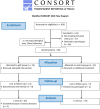Learning to play golf for elderly people with subjective memory complaints: feasibility of a single-blinded randomized pilot trial
- PMID: 34001020
- PMCID: PMC8127313
- DOI: 10.1186/s12883-021-02186-9
Learning to play golf for elderly people with subjective memory complaints: feasibility of a single-blinded randomized pilot trial
Abstract
Background: Subjective Memory Complaints (SMC) in elderly people due to preclinical Alzheimer's Disease may be associated with dysregulation of the Kynurenine Pathway (KP), with an increase in neurotoxic metabolites that affect cognition. Golf is a challenging sport with high demands on motor, sensory, and cognitive abilities, which might bear the potential to attenuate the pathological changes of preclinical AD. This trial investigated the feasibility of learning to play golf for elderly with cognitive problems and its effects on cognitive functions and the KP.
Methods: In a 22-week single-blinded randomized controlled trial, elderly people with SMC were allocated to the golf (n = 25, 180 min training/week) or control group (n = 21). Primary outcomes were feasibility (golf exam, adherence, adverse events) and general cognitive function (Alzheimer's Disease Assessment Scale). Secondary outcomes include specific cognitive functions (Response Inhibition, Corsi Block Tapping Test, Trail Making Test), KP metabolites and physical performance (6-Minute-Walk-Test). Baseline-adjusted Analysis-of-Covariance was conducted for each outcome.
Results: 42 participants were analyzed. All participants that underwent the golf exam after the intervention passed it (20/23). Attendance rate of the golf intervention was 75 %. No adverse events or drop-outs related to the intervention occurred. A significant time*group interaction (p = 0.012, F = 7.050, Cohen's d = 0.89) was found for correct responses on the Response Inhibition task, but not for ADAS-Cog. Moreover, a significant time*group interaction for Quinolinic acid to Tryptophan ratios (p = 0.022, F = 5.769, Cohen's d = 0.84) in favor of the golf group was observed. An uncorrected negative correlation between attendance rate and delta Quinolinic acid to Kynurenic acid ratios in the golf group (p = 0.039, r=-0.443) was found as well.
Conclusions: The findings indicate that learning golf is feasible and safe for elderly people with cognitive problems. Preliminary results suggest positive effects on attention and the KP. To explore the whole potential of golfing and its effect on cognitive decline, a larger cohort should be studied over a longer period with higher cardiovascular demands.
Trial registration: The trial was retrospectively registered (2nd July 2018) at the German Clinical Trials Register ( DRKS00014921 ).
Keywords: Alzheimer’s Disease; Cognitive Performance; Golf; Kynurenine pathway; Subjective memory complaints.
Conflict of interest statement
The golf training was financially supported by the Heinz Nixdorf Westfalian foundation.
The authors declare no competing interests.
Figures





References
Publication types
MeSH terms
LinkOut - more resources
Full Text Sources
Other Literature Sources
Medical

